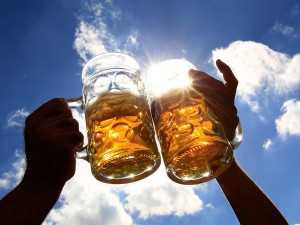And it is affecting breweries.
Carbon dioxide has no taste, no odor, and no color — but it’s a vital ingredient in the beer business, from putting frothy bubbles in brews to blocking oxidization that makes beer taste stale.
But brewers are now worried that a carbon dioxide shortage could force production cuts and price hikes. It’s the latest threat to an industry that’s been whipsawed by the COVID-19 pandemic.
“We’ve talked to our supplier, and our supplier basically told us they were not taking on any new clients to make sure that their long-term clients have a steady supply of CO2,” Bryan Van Den Oever of Red Bear Brewing in Washington, D.C., told NPR’s Morning Edition.
Beer makers have dealt with carbon dioxide shortages and price hikes for much of the pandemic, similar to higher costs for aluminum cans and cardboard. But as of August, brewers’ carbon dioxide costs had spiked more sharply than any other “input” cost in recent months, according to a graph shared by Bart Watson, chief economist for the Brewers Association.
And experts believe carbon dioxide will become more scarce as fall begins.
Three main factors are behind what Paul Pflieger, communications director of the Compressed Gas Association trade group, calls “CO2 tightness.” Two of them have to do with how carbon dioxide is produced: It’s a byproduct of other processes, such as ammonia and ethanol production.
But this fall, ammonia plants are undergoing scheduled maintenance shutdowns that will keep them from producing carbon dioxide, Pflieger said. Similarly, many ethanol plants that went offline during the pandemic haven’t resumed operations. And then there’s the weather: The beverage industry accounts for 14% of U.S. carbon dioxide, but demand soars across the board when it’s hot.
“Every summer, demand for CO2 skyrockets because people want more beverages,” and dry ice (the solid form of carbon dioxide) is used more, Pflieger told NPR. “The record heat that we’re seeing in this country and around the world is making this worse.”
Pflieger says his association’s members are working hard to fulfill customers’ orders. But he also warns that the situation will persist for weeks to come.
“We anticipate things to start reaching some normalcy in the next 30 to 60 days,” he said.
Well, that’s good news. It’s also good news that at least in Texas, some breweries have the ability to capture the CO2 they generate in the fermentation process for use in the other parts of the process. I have to say, even typing the words “carbon dioxide shortage” sounds ludicrous in this day and age, but we live in truly weird times. The Current has more.

